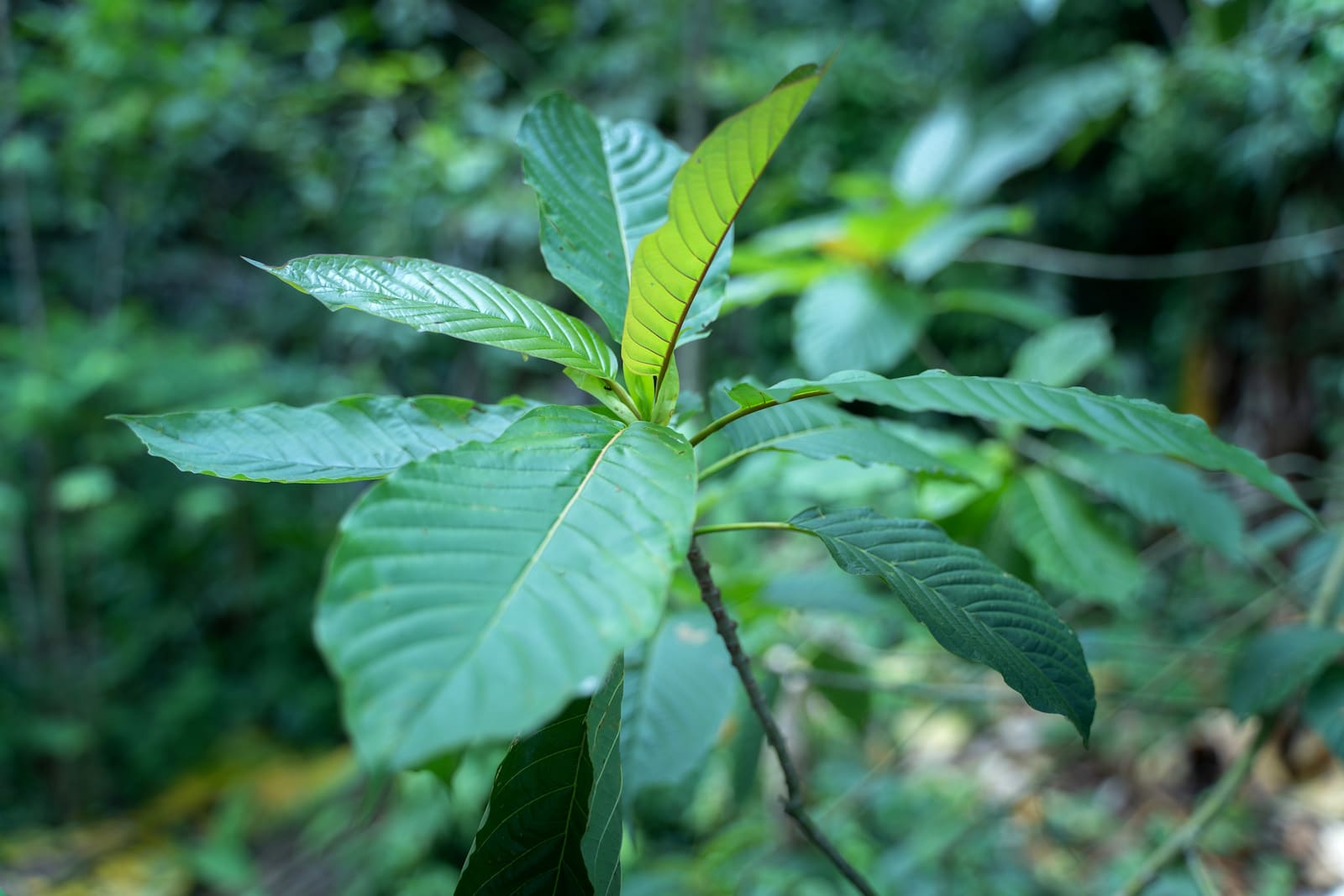Table of Contents
Deemed as “natural” and a “safer alternative for opioid addiction,” kratom has risen in popularity in mainstream society, especially since it is legal in many states. However, the Food and Drug Administration warns users about the “deadly risks associated with kratom” and that, ultimately, the usage should not be treated any differently than someone consuming other addictive opioids.
So what exactly is this herb that has gained substantial acceptability, particularly among people struggling with opioid addiction? Is it dangerous to consume? And does someone consuming kratom need treatment for substance abuse?
What is Kratom, and What are Its Uses?
Kratom is abundant in the jungles of Thailand and Southeast Asia, and it has historically been used by farmers and rubber trappers wanting an energy boost and increased stamina under the long, intense hours in the sun and heat. Because this herb is in the same family as the coffee tree, many people have looked to this plant to supply “natural energy.” However, when you look into the psychotropic (mind-altering) effects this herb produces, it’s plain to see that it’s more than simply an energy-booster.
Sold in certain stores and online, typically in either powder or capsule form, many products using this plant have marketed it as a “holistic” alternative to pain medications or as a “cure” to opioid addiction, lessening the often unpleasant withdrawal symptoms accompanied by opioid addiction. However, when glancing at the labels on most of these products, one might see a warning label that claims “not for human consumption” printed on the packet. This alone can make one wonder why such a claim needs to be made.
Furthermore, kratom has similar effects to both addictive opioids and stimulants. By interacting with opioid receptors in the brain, this herb has been praised for producing sedation, pleasure, and decreased pain. Users report increased energy, sociability, and alertness when taken in small amounts. It seems, therefore, that because this plant mimics what addictive opioids produce in the user’s brain, kratom can also have dangerous side effects like opioids can have for the user.
Is Kratom Addictive?
Long story short: yes, kratom is addictive for the user. Although many people believe that kratom can help someone when detoxing off opioids or even “cure” an opiate addict, kratom is both physically and psychologically addictive, meaning that the same properties that make it a potential “opioid detox agent” are the same properties that are likely to give rise to another form of addiction. Like other opioids, kratom can cause a user to become dependent on the herb, causing the user to continue using the substance to ward off any possible withdrawal symptoms.
Furthermore, by consuming kratom, one has an increased risk of seeking harder, more effect-producing opioids to satiate the need to feel certain desired effects. As such, kratom has the potential to be a gateway substance to harder substances. By taking a closer look at this powerful plant, one can reasonably conclude that this “natural” plant is anything but a “safer alternative to an opioid addiction,” and if anything spurs the current opioid epidemic into further dangerous depths.
Is Kratom Dangerous? What are the Side Effects of Using Kratom?
Despite its unfounded health benefits to the user, kratom can cause many serious, even life-threatening side effects, similar to those experienced with opioid abuse. The reason that many people report using kratom, however, is because of the short-term effects it can have on the body. As previously mentioned, these include increased sociability, extreme happiness, increased alertness, and increased talkativeness. However, despite the short-term effects it can have on the user, consuming kratom can cause toxicity overload to the organs in the body, even putting the user at risk of having a coma.
Other symptoms of kratom usage include:
- Agitation
- Tachycardia (fast heart rate)
- Drowsiness
- Vomiting
- Seizure
- Withdrawal
- Hallucination
- Respiratory depression
- Cardiac or respiratory arrest
The sad reality is that kratom can even cause death in some users. The FDA has tracked at least 44 deaths associated with kratom usage. Unfortunately, this number may be on the rise as more and more people are trying kratom out of curiosity or with misconceptions about the safety of this herb. Because of these side effects, kratom has become a controlled substance in 16 countries and is banned in many states, including Indiana, Wisconsin, Vermont, Alabama, and Arkansas. Several more states are also starting to follow suit in banning this dangerously addictive substance.
What are the Withdrawal Symptoms and Timeline of Detoxing off Kratom?
When the brain is dependent on a psychoactive drug, such as kratom, physical and psychological withdrawal symptoms may surface as the user is detoxing off the substance. Since the brain chemistry of the kratom user is altered when abusing this substance – and kratom mimics the effects that opioid drugs have on the user – the withdrawal symptoms from kratom can mirror that of detoxing off painkillers or heroin.
And while some people may use this herb to help with the withdrawal symptoms experienced when detoxing from opioids, using it for this intent can be dangerous for the user. Using it to fill the opioid receptors that were once filled through abuse of opioids is highly ineffective and can lead to drug dependence in and of itself. It is therefore beneficial that if one is trying to detox off opioids, they seek professional medical help instead of using kratom as a transition.
When detoxing off kratom, one can expect to experience certain withdrawal symptoms. The severity of the symptoms experienced varies person-to-person depending on many factors, such as genetics, how severe the addiction was (how much was taken and the duration of usage), and any underlying medical conditions the person may have (depression, anxiety, etc.).
Common kratom withdrawal symptoms include:
- Runny nose
- Headaches and muscle aches
- Joint or muscle pain
- Arm and leg spasms
- Hostility
- Aggression
- Mood swings
- Depression
- Anxiety
- Insomnia
- Nausea
- Constipation
- Tremors
- Chills
- Sweating
- Lethargy
Kratom withdrawal is similar to opioid withdrawal: symptoms typically start 6-12 hours after the last dose, peaking around 2-3 days and lasting 5-10 days. However, psychological factors such as depression, anxiety, and mood swings may last longer, especially if these were issues before kratom was introduced to the user. Because the “rebound effect,” the symptoms experienced when the body’s chemistry is trying to come back to equilibrium after substance abuse, can cause intense withdrawal symptoms, one must seek the help of a medical professional or go to an inpatient/intensive outpatient drug rehab facility that can help monitor the individual and taper off the drug slowly.
Treatment for Kratom Addiction
Because kratom is legal in many states and has a misconceived notion of being a natural, safe painkiller alternative, many people addicted to kratom may put off seeking treatment for their addiction. Unfortunately, in this case, it may cause the addiction to develop into illegal opioid usage before realizing the problem at hand.
Addiction to kratom might look like:
- A need to consume the herb to feel “functional”
- Intentionally seeking the drug
- Struggling to maintain daily tasks
- isolation from friends/family because of using kratom
If this is the case, it is best to seek help immediately to prevent a further progression into the disease of addiction.
Seek guidance through a medical professional or reach out to an inpatient/intensive outpatient rehab center that can help guide you through a period of detox, therapy for why you are addicted to the substance (underlying emotional coping, etc.), and an integration process for how to do daily life free from drugs successfully. Finding the right detox program is essential to mitigate the unpleasant withdrawal symptoms often experienced when detoxing off kratom.
If you or a loved one is struggling with an addiction to kratom, the time to get help is now. By seeking treatment, you can be set on the drug-free path you deserve.
Sources:
Infinite Recovery has strict sourcing guidelines and relies on peer-reviewed studies, academic research institutions, and medical associations for our references. We avoid using tertiary references as our sources. You can learn more about how we source our references by reading our editorial guidelines and medical review policy.
- Gottlieb S. Statement from FDA Commissioner Scott Gottlieb, M.D. on FDA advisory about deadly risks associated with kratom. FDA. Published April 5, 2018. Accessed June 24, 2022. https://www.fda.gov/news-events/press-announcements/statement-fda-commissioner-scott-gottlieb-md-fda-advisory-about-deadly-risks-associated-kratom
- Fuller T. Leaf for Drug Cocktail Adds to Thailand’s Woes. The New York Times. Published July 22, 2012. Accessed June 24, 2022. https://www.nytimes.com/2012/07/23/world/asia/kratom-leaf-for-drug-cocktail-adds-to-thailands-woes.html
- Eggleston W, Stoppacher R, Suen K, Marraffa JM, Nelson LS. Kratom Use and Toxicities in the United States. Pharmacotherapy. 2019;39(7):775-777. doi:10.1002/phar.2280
















